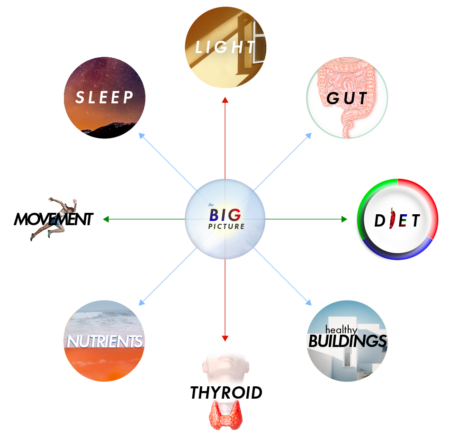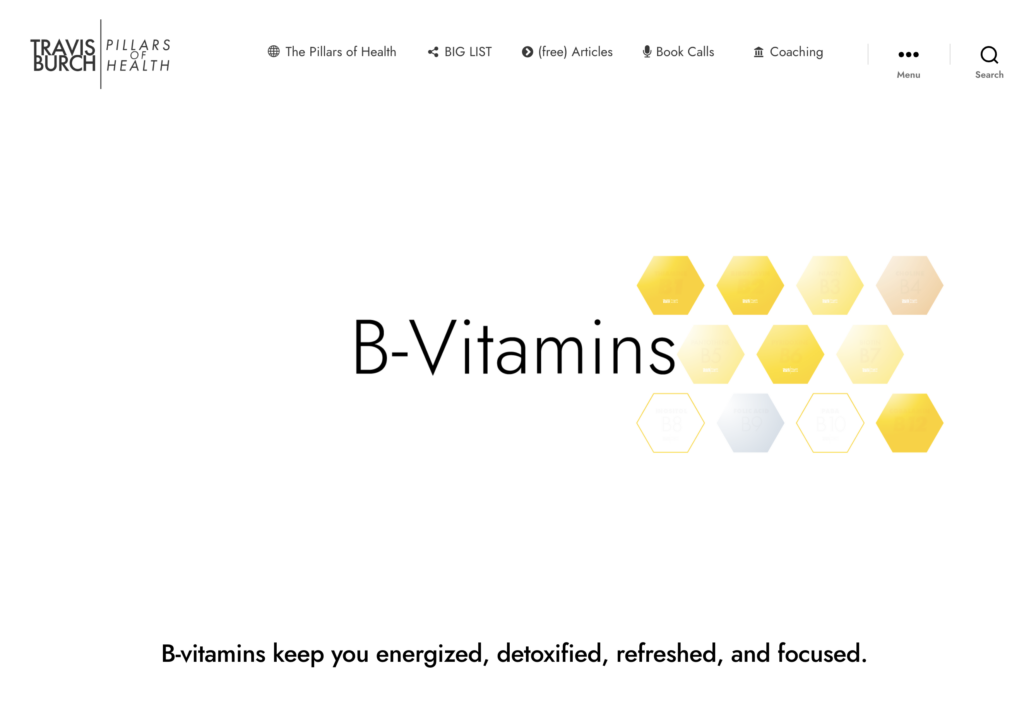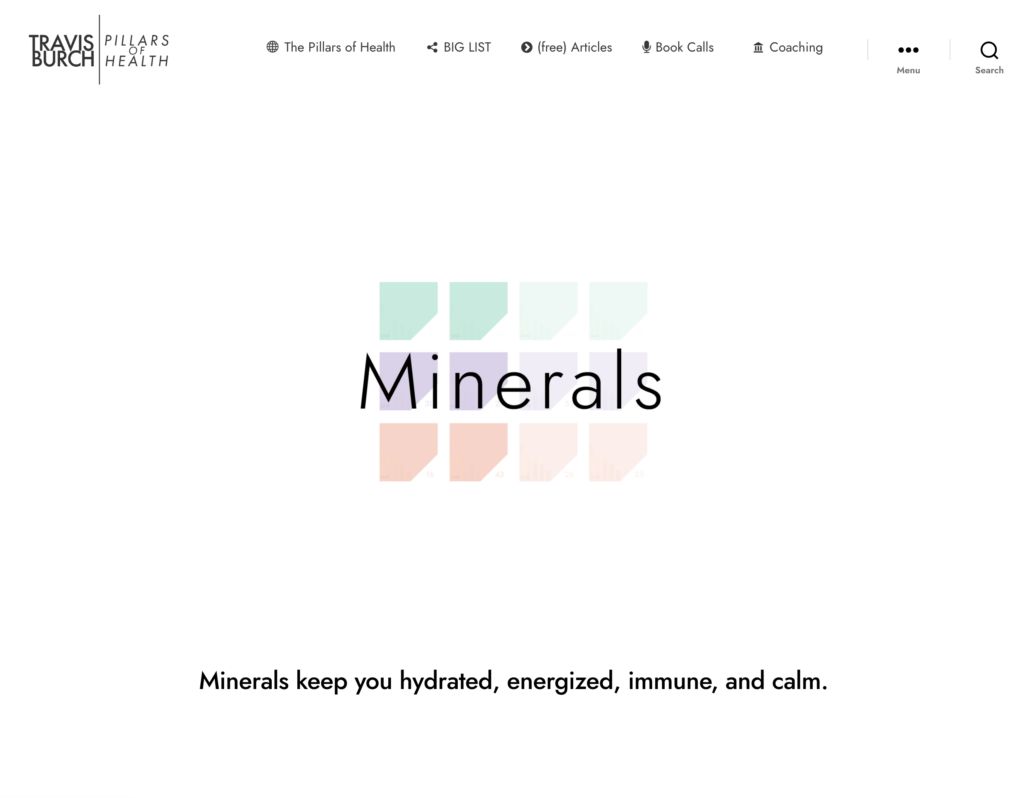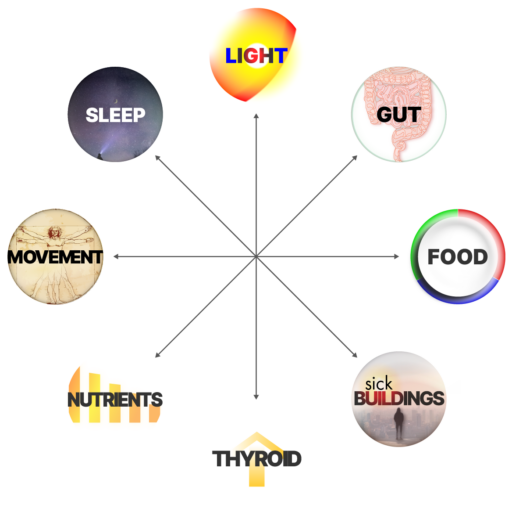
B-vitamins keep you energized, detoxified, refreshed, and focused.
Table of Contents
B-vitamins are a powerhouse of metabolic energy. They make your cells go.
Without them, you would waste away, with no vigor. Every bodily function would slow. Sleep would fail. Digestion would slow to a crawl. Your immunity would dip to nothing. Your nervous system would become sluggish, with neuropathy (tingling and loss of feeling).
You really don’t want to be low in B-vitamins!
And if you’re trying to figure out how to feel better each day, these nutrients really matter.
Now, just because deficiency is a big problem, doesn’t mean you can’t overdo them. I work with new clients almost every month who have suffered from B-vitamin overdose. (If that doesn’t sound real, trust me, it is!).
If you’re someone that responds well to high-dose B-complexes (and multi’s), that’s great! Continue taking as you like. (Though you might still find benefit from this more-involved approach).
But if you’re somone who is more sensitive to imbalances, this is the page for you.
First, let’s establish a baseline for how to receive reasonable daily doses of all B-vitamins.
Then, add individual B-vitamins on top — safely. Rotate through individual B-vitamins once or twice per week apiece.
Some people won’t tolerate even a low-dose B-complex or multi-vitamin. If you discover this is you, you’ll want to jump directly to the second step: Taking individual B-vitamins, finding which one(s) your body responds to.
A wise approach understands that the body — in illness & aging — needs to slowly and sustainably balance B-vitamin levels.
What are the B-Vitamins?

Meet the (11) B-Vitamins
(8) Official B’s
There are eight (8) B-vitamins that are universally considered essential B-vitamins.
- B1 — Thiamin
- B2 — Riboflavin
- B3 — Niacin
- B5 — Pantothene
- B6 — Pyridoxine
- B7 — Biotin
- B9 — Folic Acid
- B12 — Cobalamin
All of these official B’s are essential for your health — and must be balanced with each other.
(3) Extra
Three (3) more are considered “not official” B-vitamins. However, these have health benefits and it is helpful — for the sake of balance — to think of them as B-vitamins.
- B4 — Choline
- B8 — Inositol
- B10 — PABA
The most beneficial extra B-vitamin is B4 (choline).
The B-Vitamins are involved in every bodily function.
Interested in optimizing a biological function? You can’t without sufficient B-vitamins.
Vitamin B contributes to the overall health and wellbeing, including that of energy metabolism, methylation, synthesis and DNA repair and proper immune function.
https://pubmed.ncbi.nlm.nih.gov/30779018/
Deficiencies significantly affect your entire body’s health.
B vitamins act as coenzymes in a myriad of cellular reactions. These include energy production, methyl donor generation, neurotransmitter synthesis, and immune functions. Due to the ubiquitous roles of these vitamins, their deficiencies significantly affect the host’s metabolism.
https://www.ncbi.nlm.nih.gov/pmc/articles/PMC9227236/
Deficiency in B vitamins has been linked to neurocognitive disorders, mitochondrial dysfunction, immune dysfunction and inflammatory conditions.
https://pubmed.ncbi.nlm.nih.gov/30779018/
They are especially critical for turning food into energy. Therefore, the B-vitamins drastically affect how you feel each day.
B-vitamins are received from the diet (especially meat products) and are produced by healthy gut flora.
If your gut health is poor, your microbes are not producing sufficient B-vitamins for you whenever you digest meals.
For long-term health, fixing the gut microbiome is essential to the body’s nutrient balance.
In poor gut health, vitamins in food are poorly absorbed. These deficiencies can then affect your gut health!
Vitamin B consists of a group of water-soluble micronutrients that are mainly derived from the daily diet. They serve as cofactors, mediating multiple metabolic pathways in humans. As an integrated part of human health, gut microbiota could produce, consume, and even compete for vitamin B with the host.
https://www.ncbi.nlm.nih.gov/pmc/articles/PMC9792504/
The interplay between gut microbiota and the host might be a crucial factor affecting the absorbing processes of vitamin B.
On the other hand, vitamin B supplementation or deficiency might impact the growth of specific bacteria, resulting in changes in the composition and function of gut microbiota.
Together, the interplay between vitamin B and gut microbiota might systemically contribute to human health.
https://www.ncbi.nlm.nih.gov/pmc/articles/PMC9792504/
Remarkably, excessive supplementation could also affect your gut health, too.
Sufficient B-vitamins severely slows the aging process.
In ageing populations B vitamin deficiency has been linked to cardiovascular disorders, cognitive dysfunction, osteoporosis and methylation disorders and can increase the risk of developing degenerative diseases, particularly cardiovascular disease, cognitive diseases and osteoporosis. Optimization of B vitamin status in the elderly may prove beneficial in the prevention of degenerative diseases.
https://pubmed.ncbi.nlm.nih.gov/30779018/
Therefore — and as we saw in Why Nutrients? — supplementation of nutrients is essential during poor gut health (and in most instances of chronic illness).
B-vitamins are essential for immunity, digestion, and healthy nervous system function, as well, but it might be their premier role in detoxification where they truly impact health for many suffering from chronic illness — when the body tends to be “toxic” from build up of metabolic waste, gut endotoxins, and mold mycotoxins.
The B-vitamins offer a special opportunity for the chronically ill to both recover and to feel better — and this is best achieved if concepts of balance and reasonable doses are kept in mind.
2

Biological Roles of the B-Vitamins
(click for more about each B-vitamin)
B1
Thiamin — 1.2mg (DV)
- Carbohydrate metabolism
- Energy for nervous system, heart, brain, muscles
B2
Riboflavin — 1.3mg (DV)
- Carbohydrate, protein, & fat metabolism
- Energy levels
- Recycling glutathione
- Converting tryptophan to niacin
- Vitamin B6 metabolism
- Proper homocysteine levels
- FMD & FAN (coenzymes) production
- Only 27 mg can be absorbed at a time
- Important in migraine & cancer prevention
B3
Niacin— 16mg (DV)
- The function of hundreds of enzymes
- Nearly all metabolic reduction/oxidation (for energy)
- Maintaining gene integrity & expression
- Affects cholesterol
- Insulin sensitivity
- Cardiovascular (endothelial) health
- Improves inflammation
B4
Choline — 550mg (DV)
- Methyl donor
- Cell membrane integrity (phospholipids: phosphatidylcholine & sphingomyelin)
- Acetylcholine production (mood, memory, muscle control, brain function and nervous system function)
- Gene expression
- Cell membrane signaling
- Fat metabolism
- Early brain development
B5
Pantothene — 5mg (DV)
- Essential for coenzyme A (anabolism and catabolism)
- Required for fatty acid synthesis
B6
Pyridoxine — 1.3mg (DV)
- Necessary for over 100 enzyme reactions
- Especially necessary for protein metabolism
- Important for amino acid, carbohydrate, and fat metabolism
- Required for cognitive development and biosynthesis of neurotransmitters
- Enables glycogenolysis (turning stored glycogen into glucose)
- Promotes immunity
B7
Biotin — 30mcg (DV)
- Critical for enzymes that metabolize carbs, proteins, and fat
- Important for histone modifications (including methylation)
- Essential for gene regulation
- Involved in cell signaling
B8
Inositol — ~1g (no official DV)
- Insulin-like properties
- Component of cell membranes
- Hormones controlling mood and depression (dopamine & serotonin)
- Improves thyroid (T4) levels
B9
Folate — 400mcg (DV)
- Cell division
- Converts homocysteine to methionine
- Methylation
B10
PABA ~50mg (no official DV)
- Folic acid synthesis
- Red blood cell formation
- Protein metabolism
B12
Cobalamin ~2.5mcg (DV)
- Red blood cell formation
- Neurological function
- DNA synthesis
- Methylation
- Protein & fat metabolism
- Hemoglobin synthesis
B-vitamins can become unbalanced, among themselves.
In other words, taking lots of B1 could deplete all other B-vitamins. This would especially deplete B2.
Even though B1 tops the list of importance, excessive amounts can deplete all other B’s.
This risk of imbalance rises if we are chronically inflammed — the more inflammed, the easier it is to cause imbalance.
The same can happen with B2 — or any other B-vitamin. Too much of any single B can deplete all other B’s.
This is common in people who supplement B12 (injections or pills), as well as those taking Biotin for hair growth.
This is, perhaps, one reason why single B-vitamins often work for a few weeks or months, and then rapidly stop working — or worse, cause problems: Imbalance.
High Doses Are Not Always Safe
Taking a B-Complex would solve this problem, right?
Unfortunately, no. Most B-complexes use extremely high doses, and that’s a problem.
Yes, they might contain all B-vitamins. But that’s not the end of the story.
The trouble is multi-faceted.
For one, high dose B-vitamins can rapidly deplete minerals.
Feeling dehydrated — or even chronic fatigue and insomnia — while taking high-dose B-complexes isn’t unusual.
Further, high-dose B-vitamins can rapidly deplete blood glucose.
If you struggle with hypoglycemia, high-dose B-vitamins can wreck your homeostasis. In hypoglycemia, these complexes can wreck sleep.
What’s more, high dose B-complexes can cause imbalances, rapidly depleting their own ingredients.
It’s not enough to have all vitamins present. The ratios matter, too.
Not in the sense that there are perfect ratios — and you must follow them. That’s not what I mean.
I’ll illustrate: Imagine you took 100% DV mg of B1 — thiamin.
At the same time, you also took 10,000% DV of B2 — riboflavin.
Here’s how things work in the body: When there’s too much of one nutrient, it winds up depleting its cofactors. (We see this with calcium/magnesim. And Vitamins D and A. Zinc and copper. On and on.)
In this example scenario, yes, you’re taking 100% DV of B1. But you’re depleting it so rapidly — and so efficiently — with a B2 megadose, that you would likely begin showing signs of B1 deficiency within a few weeks or months.
It’s just the way the body works, and this is especially true during health challenges and aging!
Taking it even further, the body can only absorb so much of any nutrient at once.
And that amount changes for different nutrients! This is why megadoses can cause more harm than good.
For instance, if you took 10,000% DV of B1 and B2, you wouldn’t absorb the same amount of both.
- The body can absorb 27mg at a time of B2.
- But it can only absorb about 5mg of B1, at a time.
So, if you take 25mg of both, your body would absorb virtually 100% (27mg) of the B2, and only 20% (5mg) of the B1. Can you see how megadoses create imbalance?
And this is true for every B-vitamin: Each one has a maximum absorbed at once.
Further, supplement manufacturers often fudge their label numbers, to suit their needs.
And sometimes, there truly is no established Daily Value.
In the two examples below, Example 1 contains 25mg of niacinamide — and calls it 156%. Example 2 contains 50mg, yet calls it 667%.
Real problems can come from excessive amounts of any nutrient!
Example 1
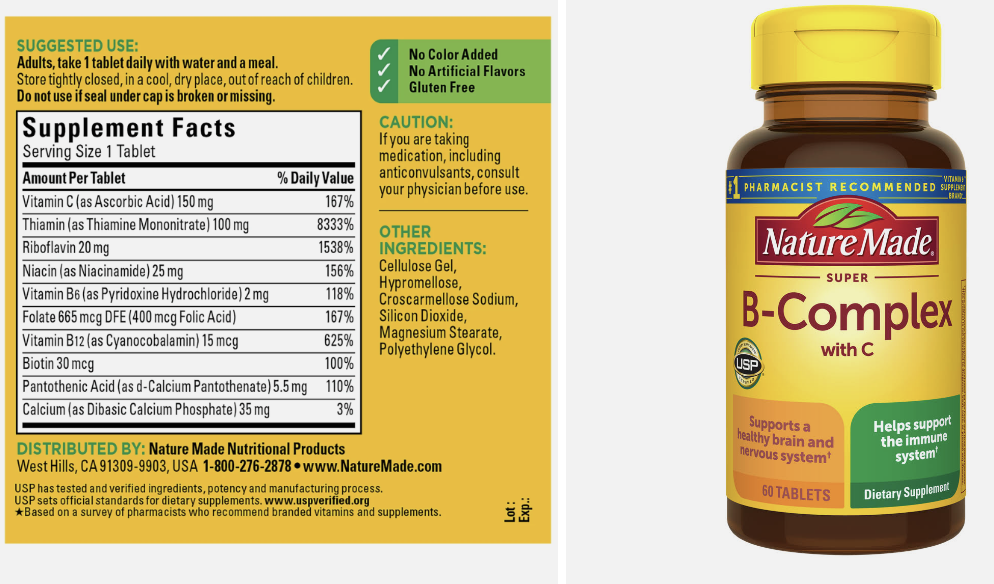
Example 2
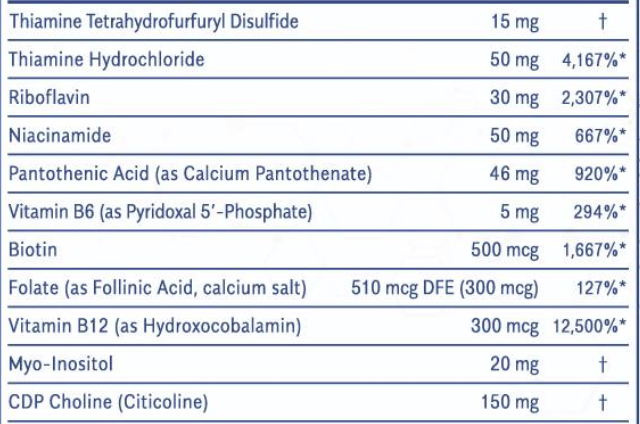
Or, in Example 2, the first ingredient is TTFD, a fat-soluble form of B1. Nobody knows how well this is absorbed, so there truly is no DV for it. What I’ve seen, though, is that this form is so incredibly absorbable that it can cause imbalances extremely easily. And of course, not only is TTFD absorbable, it is stored in fat cells indefinitely. I recommend caution with all fat-soluble nutrients.
Surprisingly, the body doesn’t store all B-vitamins equally.
We often hear that B-vitamins are “water-soluble” — so they cannot be stored. But this isn’t entirely true. B1 can be stored for up to 18 days in the liver (source).
B6 can also be “stored” in the body — in muscles. B6 toxicity is a real problem — and many, many supplements contain B6 because it is cheap to add.
Megadosing B-complexes can result in toxic levels of B6 and excessive levels of B1 — sufficient to interfere with and deplete all other B-vitamins.
These sorts of imbalances are not pleasant: They can disrupt sleep, energy metabolism, joints, and cause constipation and diarrhea.
Finally, in sick building syndrome, the body cannot tolerate anything in high doses.
When homeostasis is disrupted enough by chronic inflammation — from sick building syndrome — the body tolerates very little in high doses. There is immense value, here, in small, balanced doses. That’s the only way the body will be able to benefit from these nutrients: Small doses, that are balanced.
Wise nutritional balancing cannot overcome sick buildings on its own — but it can be a part of feeling better while living there. It can also propel you forward faster once you leave your sick building (or fix its problems).
All in all, high-dose B-complexes often result in questionable, confusing, up-and-down outcomes — with folks feeling jittery or somehow unbalanced while taking them. Some find themselves in a major crash.
As a result, B-complexes tend to sit on the shelf in the home of the chronically ill.
What’s worse: It’s difficult to find B-complex products containing moderate doses. Instead, most individual B’s come in dosages closer to 1000% DV.
Over time, high doses can cause issues with metabolic function and nutrient imbalance.
Mindset Goal: The Long View
Quick “results” from B-vitamin supplementation should usually not be the goal. Don’t be distracted by that goal. Long-term results are what you’re after. Sustainability.
While there are some people who benefit from megadosing B-vitamins indefinitely, that just isn’t the norm. Most people — without genetic polymorphisms that require megadosing — will run into trouble at some point from megadosing.
When problems arise — and the results disappear — from unbalanced, excessive B-vitamin supplementation, it’s best to slow down and think about why those results happened.
Remember, with too-fast, or too–intense, supplementation we can upset bodily systems and deplete cofactors.
All nutrients must be balanced in the body. In illness, the body often struggles to balance nutrients on its own — due to deficiency, poor gut health, toxicity, infection, and inflammation. If this is your reality, keep your supplementation balanced.
But how do we do that?

Your Progress — 50%
[/wcm_nonmember]



